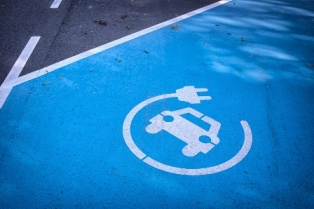What you should know about fuel-cell cars
Josh Monen
 The Honda FCX Clarity, the Toyota FCV-R Concept and the Chevrolet Equinox fuel-cell vehicles are all examples of limited production hydrogen fuel-cell vehicles that have been released in past years.
The Honda FCX Clarity, the Toyota FCV-R Concept and the Chevrolet Equinox fuel-cell vehicles are all examples of limited production hydrogen fuel-cell vehicles that have been released in past years.
But in spring 2014, Hyundai plans to release the world’s first mass-produced fuel-cell vehicle: the Hyundai Tucson Fuel Cell. John Krafcik, former president and CEO of Hyundai Motor America, says the company expects to build and sell about 1,000 Tucson Fuel Cell cars over the next two years. If demand is higher than that, there’s a possibility the number could rise, Krafcik says. (insert image here, align right)
John O’Dell, senior editor for fuel efficiency at Edmunds, a popular online resource for automotive information, says, “The Hyundai Tucson Fuel Cell is one of the most exciting new developments in the fuel-efficiency and green-car world for 2014.”
Kristen Hall-Geisler, author of “Take the Wheel: A Woman’s Guide to Buying a Car Her Own Damn Self,” says the Tuscon Fuel Cell “could be a game-changer (as it combines) reliable, familiar SUV architecture, which people love and feel comfortable in, with new technology that people are frankly a little frightened of.”
Fuel-cell vs. electric vehicles
The main difference between a fuel-cell vehicle and an electric vehicle is that fuel-cell vehicles generate power on board while electric cars store power on board through large batteries. A fuel-cell generates power by converting hydrogen and oxygen into water. Therefore, fuel-cell vehicles don’t need to be plugged in like electric vehicles do. Instead, they need to be refueled with hydrogen.
Plus, a fuel-cell vehicle has a longer driving range before it requires refueling. For example, the Tucson Fuel Cell can drive up to 300 miles before requiring hydrogen refueling, which only takes about 10 minutes, whereas the average range for an electric vehicle is only about 100 miles and takes longer to refuel.
How much will fuel-cell vehicles cost?
When Hyundai announced the news about its plan to release the Tucson Fuel Cell in November, it didn’t mention the cost to produce. However, according to O’Dell, Hyundai may be losing money on their Tucson Fuel Cell model. He believes the retail price will be around $50,000 but the actual cost to manufacture the vehicle is in the $75,000 to $100,000 range.
Consumers will be able to lease a Tucson Fuel Cell for $2,999 down and $499 a month for 36 months. The lease also includes unlimited hydrogen refueling. Consumers in California, the only state where the Tucson Fuel Cell will be released in 2014, are eligible for the Clean Vehicle Rebate Project (CVRP) when they purchase a fuel-cell vehicle. The benefits of the CVRP include a $2,500 purchase rebate and free access to the state’s carpool lanes.
Where can you refuel?
There are only ten retail hydrogen fuel stations operating in the U.S. and nine of them are located in Southern California (one is in South Carolina). To find out exactly where the hydrogen fuel stations are located, visit the U.S. Department of Energy-run Alternative Fuels Data Center.
However, in June 2013, the California Energy Commission approved nearly $18.7 million in grants for projects that will expand the state’s fueling infrastructure for hydrogen fuel-cell vehicles. According to a report issued by the California Fuel Cell Partnership, California will need 68 hydrogen fueling stations by 2017 to support the growing demand for fuel-cell vehicles.
What you need to know before buying a fuel-efficient vehicle
Although Hyundai believes fuel-cell vehicles represent “the next generation of electric vehicles,” they’re still not available to most people. So what are your options if you live outside Southern California and/or the $499 lease, or the estimated $50,000 purchase price, is outside your budget?
“You have to decide what’s important to you and why you want a fuel-efficient vehicle. And you have to be honest with yourself,” O’Dell says. “Is it because of your commitment to the environment? Is it because you want to be the first one on the block with the newest green car, like the fuel-cell vehicle? Or is it really because of fuel economy?”
O’Dell adds, “If you’re strictly interested in fuel economy, then you may be better off simply adjusting your driving habits or buying a compact gasoline car instead of paying the extra money for a hybrid, electric or fuel-cell car. If you have a lead foot, studies show that you can see up to a 20 to 30 percent savings on fuel simply by changing your driving habits.”
But if you already practice good gas-saving driving habits, and you still want to save money on gas, then you may want to consider a non-electric vehicle such as the 2014 Mitsubishi Mirage, which gets 40 miles per gallon. Prices start at $12,995. Another fuel-efficient option is the 2014 Scion iQ which gets 37 miles per gallon and is priced at $15,665.
See how much you could save today on your car insurance. Get your free auto insurance quotes today!
